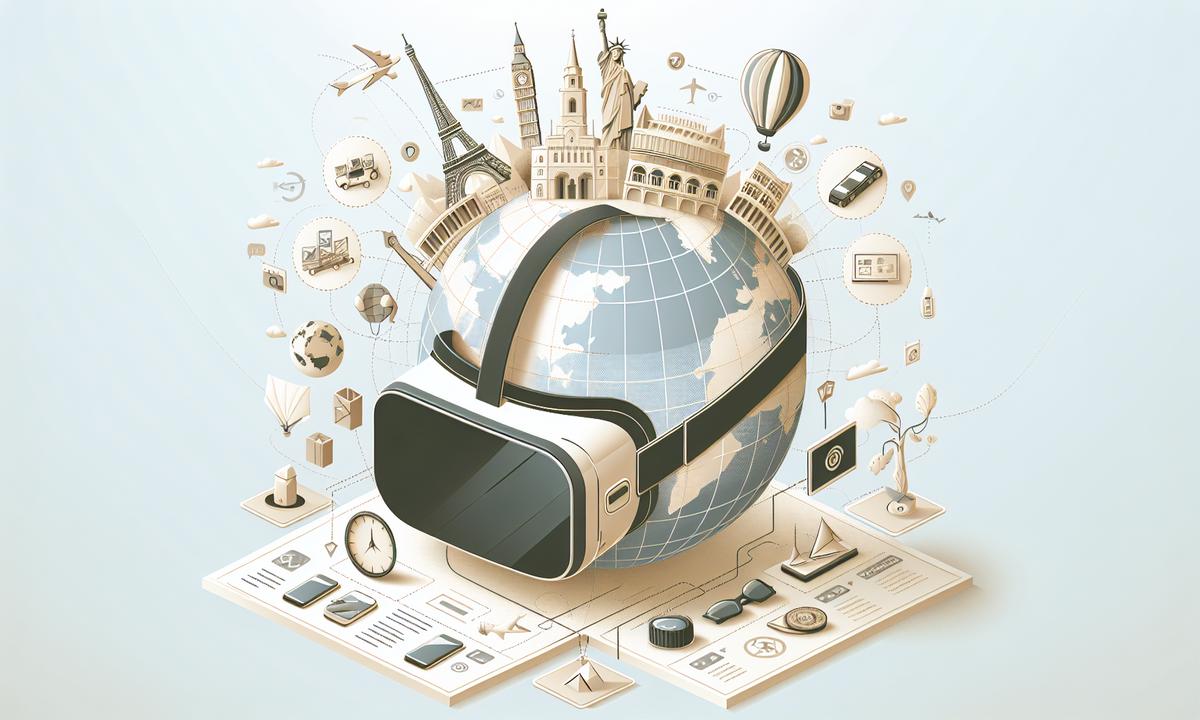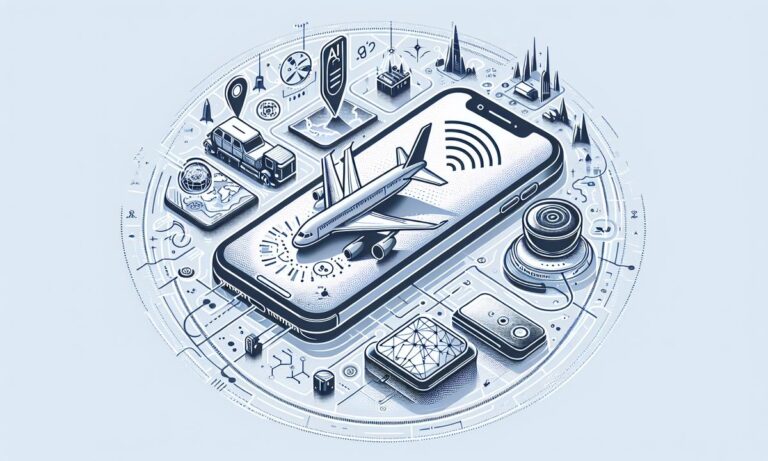Imagine experiencing the vibrant markets of Marrakech, gazing at the Eiffel Tower, or relaxing on a secluded tropical beach—all from the comfort of your home. This vision is now a reality. Welcome to the innovative era of virtual reality (VR) travel planning, a technology that is fundamentally transforming how we envision and prepare for our adventures.
The Transformative Power of Virtual Reality in Travel
VR: Redefining Pre-Travel Experiences
Virtual Reality (VR) is pioneering a new approach to travel planning, making the journey of destination discovery as captivating as browsing your favorite online feeds. By crafting interactive 3D simulations of real-world locations, VR empowers travelers to truly explore potential destinations before making any commitments.
This burgeoning trend is rapidly redefining consumer behaviors and expectations within the travel sector. Projections indicate a significant expansion, with the global AR/VR tourism market anticipated to surge from $2.9 billion in 2023 to an impressive $16.7 billion by 2032 (DataIntelo).
Market Growth and Key Drivers
The rapid growth of VR travel is fueled by a rising demand for immersive pre-travel experiences, such as virtual tours of hotels and attractions. Innovations in more affordable VR headsets and mobile-friendly applications have broadened access, bringing virtual vacation previews to millions of prospective travelers.
Furthermore, the recent global landscape accelerated the need for safe and flexible travel options, fostering a greater integration of advanced travel technologies. This momentum is reflected in market predictions, with VR in tourism expected to reach $27.5 billion by 2029, showcasing a remarkable 38.2% annual growth rate (Infosys BPM, Cognitive Market Research).
Key factors driving this expansion include the desire to experience destinations virtually before purchasing a trip, more accessible and user-friendly technology, and a reduced pre-travel anxiety. Travel providers, including hotels, airlines, and resorts, are actively leveraging VR to attract and secure new customers.
How VR Elevates Your Travel Planning
Boosting Confidence and Reducing Anxiety
One of VR’s most significant advantages is its capacity to transport travelers to their desired destinations long before packing begins. These immersive experiences allow users to virtually navigate hotel suites or cruise decks, significantly boosting confidence and minimizing any booking hesitation, particularly for unfamiliar locations.
Travel planning can often bring anxieties, especially concerning unknown destinations or accommodations. VR technology effectively alleviates these concerns. By virtually exploring amenities and surroundings, travelers gain assurance, increasing their likelihood of committing to a booking.
Tailored VR tours have proven highly effective, capable of accelerating booking speeds and enhancing conversion rates by up to 94% (Tekrevol).
Enhancing Engagement and Decision-Making
Who says planning a trip cannot be an adventure in itself? VR transforms the planning process into an unforgettable experience, captivating users in various settings like agency showrooms, websites, and trade expos. These interactive encounters help travel brands distinguish themselves and resonate deeply with consumers.
Instead of spending hours comparing brochures, imagine virtually touring multiple destinations in mere minutes. VR’s rapid previews streamline the decision-making process. This also provides powerful analytical tools for travel companies to assess user engagement, refine their offerings, and precisely deliver what travelers seek (HQSoftware).
Unlocking Destinations: Practical VR Applications
Exploring Before You Go: Hotels, Attractions, and Beyond
Imagine virtually walking through the grand lobby of a boutique hotel or ascending the ancient steps of Machu Picchu. Virtual destination discovery brings these aspirations to life, assisting travelers in selecting ideal accommodations and igniting a profound sense of wanderlust. VR travel tours offer fully interactive explorations, moving beyond static images.
Immersive Cultural Journeys from Home
Have you ever wished to join a vibrant festival in Japan or embark on an Italian art tour, all before your actual departure? VR platforms now provide access to global cultural events and activities. These virtual sneak peeks foster more informed and enthusiastic itinerary planning for future adventures.
Crafting Your Personalized Adventure
Virtual tours enable travelers to ‘try on’ various experiences, allowing them to construct a trip perfectly aligned with their individual interests. Whether your passion lies in adventure sports, culinary explorations, or architectural wonders, users can navigate their options at their own pace, ensuring a uniquely personalized journey.
The Technology and Its Impact on the US Travel Industry
Accessibility and Integration of VR Tools
The foundation of this travel revolution lies in a suite of evolving technologies. Immersive 3D environments, engaging 360-degree video, and interactive platforms are more readily available than ever before. Affordable VR headsets and mobile-compatible applications mean you no longer need extensive technical expertise or a large budget to begin your virtual adventure.
Travel firms across the US are quickly adopting these advancements, with resorts, tour operators, and major airlines integrating VR for destination showcasing and interactive planning. Marker-based Augmented Reality (AR) apps further enhance the realism of these virtual tours by blending digital content with the physical world (Worth).
Strategic Advantages for US Travel Businesses
For US travel companies, this represents a significant opportunity to gain a competitive edge. By offering compelling immersive previews, businesses can effectively differentiate their services within a highly competitive market. This not only boosts booking rates for both domestic and international travel but also instills consumer confidence.
Consumers, particularly those making substantial investments or seeking secure travel alternatives, receive reassurance that they are making the right choice. VR also amplifies the impact of marketing campaigns, attracting curious travelers and building crucial trust even before any financial commitment is made.
Optimizing for Discovery: SEO and User Experience
VR Content and Search Engine Visibility
Beyond captivating travelers, immersive VR content also appeals strongly to search engines. Interactive virtual tour experiences naturally lead to extended dwell times, reduced bounce rates, and increased click-through rates. These metrics are vital for improving search engine rankings and overall visibility.
Further enhancing this, implementing schema markup makes travel businesses eligible for rich snippets in search results, presenting more appealing and informative listings. SEO is not merely about rankings; it is about ensuring users enjoy a seamless and enriching journey, leading to more bookings and a reputation for innovation (Google Schema Documentation).
Seamless Experiences: Mobile and Local SEO
Considering over 70% of travel searches occur on mobile devices, optimizing VR travel planning for mobile is paramount. This requires responsive design and extremely fast loading of 360° content. Key elements include streamlined URL structures, specific schema markup for `LocalBusiness` and `TouristAttraction`, and compressed assets.
These technical optimizations are essential for a smooth mobile experience. Furthermore, smooth navigation and comprehensive accessibility features, such as captions and keyboard navigation for VR tours, are non-negotiable. This ensures that every individual can fully enjoy your virtual destination discovery, broadening your audience (Google Schema LocalBusiness).
The Horizon of Travel: VR, AI, and Future Opportunities
Synergy with Artificial Intelligence and Augmented Reality
The future landscape of travel technology is inherently interconnected. Virtual Reality is increasingly finding powerful synergies with Artificial Intelligence (AI) and Augmented Reality (AR) to craft hyper-personalized journeys. Imagine engaging in virtual treasure hunts or exploring guided VR tours with AI-powered narration.
Even destinations adapting in real-time to your unique preferences are swiftly becoming realities for today’s tech-savvy travelers. For a deeper understanding of how AI is shaping the future of travel, explore our dedicated resource: AI in Everyday Life: A Traveler’s Guide to Smart Tech & Future Journeys.
Meeting Evolving Traveler Expectations
Consumer expectations are continually rising. The next generation of US travelers will demand both groundbreaking innovation and seamless convenience. This presents both a significant challenge and a remarkable opportunity for the travel industry. Companies that strategically leverage VR will lead in fostering customer loyalty and engagement.
Your Next Journey Starts Here
Virtual reality is far more than a passing trend; it stands as a powerful enabler in modern travel planning. It offers truly immersive experiences that significantly boost confidence, alleviate stress, and inspire a profound sense of adventure. For travelers across the United States, the exciting prospect of exploring before you go is now a tangible reality, not just a fantasy.
Are you ready to embrace the transformative future of travel? Stay curious, begin your exploration virtually, and let your next unforgettable journey commence with a simple click.



